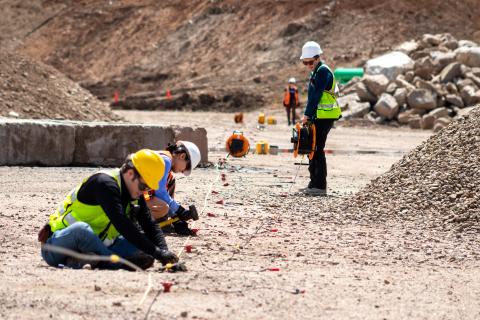All Categories
Featured
Table of Contents
How To Become A Geophysicist in Rossmoyne Aus 2021
This work is increasingly contracted out, so consultancies offer another source of employment. Consultancy firms vary in size, from very little companies to big multinationals. Some consultancies are rather specialised in utilizing particular geophysical methods or operating in particular locations, while others offer a more varied variety of services to their customers.
The extraction of gas from landfill sites is another location of work and this may grow in the future. Exploration business may carry out work for building firms, public utility, mining business and environmental companies, so geophysicists might be employed in any of these settings. Other companies consist of: geological surveysgovernment bodies and agenciesuniversities and research institutes.


Jobs may be noted in the oil and gas sector press. Recruitment is affected by oil cost changes and the level of competitors for positions varies depending on this. Professions Days, which cover the complete variety of geoscience careers and are generally participated in by a variety of essential market companies, are run by The Geological Society.
Geophysicist - Salary, How To Become, Job Description & ... in Ocean Reef Oz 2020
Some of the big oil and gas companies use a full two-year structured training program throughout the breadth of geophysics, consisting of the opportunity to experience operate in different groups before specialising in one area. Your training might include work on: existing wellsmagnetic and gravitational possible field information analysisresearchrock analysis. However, it's more normal for your initial training to be supplied on the task.

There may be a probationary duration throughout which you work together with a knowledgeable associate. Competency-based appraisals occur frequently in a lot of firms. In smaller firms, and for academic posts, there is unlikely to be any official training - you'll be expected to begin work straightaway and get skills as you go along.
If you work for a smaller business, you might discover that you need to take duty for arranging and moneying your own development and training. If you have a geology degree, membership of The Geological Society can be helpful for networking and for maintaining to date with the industry.
Geophysicist Job Description, Career As A Geophysicist ... in Lockridge Oz 2023
You may likewise find it useful to join the PESGB (The Petroleum Exploration Society of Great Britain, which has a geophysics unique interest group. After a probationary period, and as soon as you've gotten some experience, you could advance to senior geophysicist, then group leader and then into a senior role in management.
The ease of movement in between roles depends on the business structure. Study at Masters or Ph, D level in a subject related to geophysics or geosciences might help with your profession advancement and development. The employment market within the oil and gas industry is extremely based on cost and this might affect your opportunities for profession development.
Not all tasks are reliant on the oil and gas markets. For knowledgeable geophysicists, freelance consultancy provides a great path for profession development. You can likewise specialise in a particular area of geophysics. As a geophysicist, you're most likely to have several tasks throughout your working life. International mobility is essential for handling peaks and troughs in different countries at various times.
Hydrographic And Geophysical Surveys in Burswood Australia 2023
From geophysics, it's possible to focus on seismology (completing more training to end up being a seismic interpreter) or to move into associated areas such as engineering geology or threat forecast.
Deciding what to study in college is a tough option. Even if you know that your field of interest lies in science, what program of study is right for you?
The first step to achieving your objective of becoming a geophysicist is making a degree. Even for entry-level positions in the field of geoscience, you'll require a bachelor's degree (a geophysicist college degree) from a recognized college or university. Some research positions require prospects to hold master's degrees and even Ph.
What Is The Difference Between Geophysical Method And ... in Kingsley Australia 2021
Doctoral degrees are especially crucial if you plan to teach at a four-year organization. Geophysicists apply physics principles and methods to study the gravitational, magnetic, and electrical fields of the earth. This advances scientists' knowledge of both the planet's interior core and its surface area. Geophysicists need to be able to: analyze rocks, photographs, and other pieces of data conduct research study both in the field and in laboratories create maps and charts of their findings compose reports To achieve all this, trainees require a specialized education for geophysicist careers.
As specified above, you'll need a bachelor's degree in geoscience or a related discipline, such as a physical science or a natural science, to land an entry-level job. But trainees can also prepare by majoring in subjects like: Biology Chemistry Computer technology Engineering Mathematics Physics The above geophysicist majors offer a more generalized technique to a single clinical discipline, however many programs require students to take one or more geology course.
Table of Contents
Latest Posts
Geophysical And Geotechnical Assessment in Mount Hawthorn Western Australia 2020
Geophysicist Bob Embley: Ocean Exploration Careers in Alexander Heights Oz 2022
Geophysical Surveys: Definition & Methods in Woodlands Western Australia 2021
More
Latest Posts
Geophysical And Geotechnical Assessment in Mount Hawthorn Western Australia 2020
Geophysicist Bob Embley: Ocean Exploration Careers in Alexander Heights Oz 2022
Geophysical Surveys: Definition & Methods in Woodlands Western Australia 2021